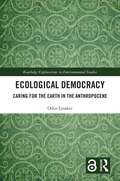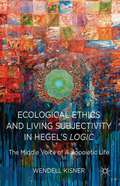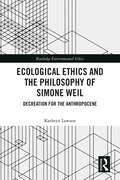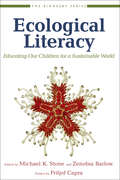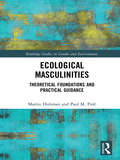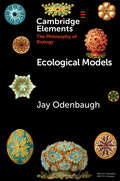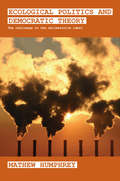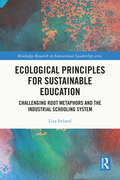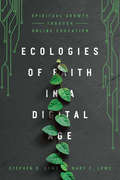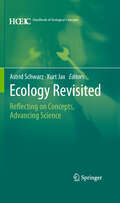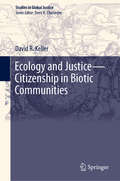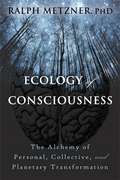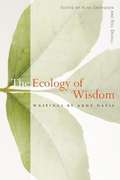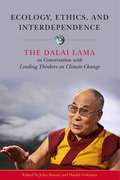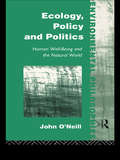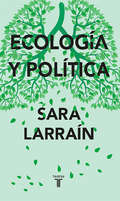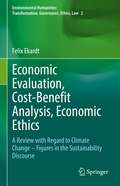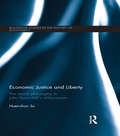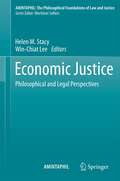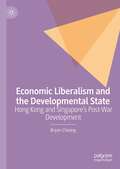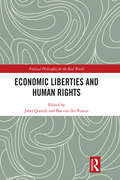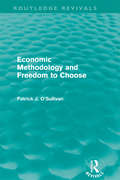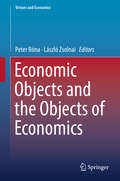- Table View
- List View
Ecological Democracy: Caring for the Earth in the Anthropocene (Routledge Explorations in Environmental Studies)
by Odin LysakerEcological Democracy offers an original, thought-provoking, and engaging treatment of why and how democracy should be re-imagined in reaction to today’s ecological crisis. The book explains that one need to re-imagine both the view on nature and democratic ideals within the same framework in the Anthropocene, the present geological epoch of human-made instability in the Earth system and its planetary boundaries. This book proposes unique and challenging readings of green political theory and its development of ecological democracy in the last four decades. The book is the first to offer a systematic and detailed interpretation of the role of critical theory vis-à-vis green political theory through an update regarding current non-anthropocentric critical theorists and how they may contribute to the further development of ecological democracy. Ecological Democracy builds further on deep ecology, ecophenomenology, and animism by articulating an ecocentric view on nature which defends an intrinsic moral value of all existence as well as formulating the democratic principle of all ecologically affected parties.This book provides a sophisticated, convincing, and accessible argument for how to re-imagine ecological democracy as ecocentrism in practice: ecological love. To love ecologically means caring for and encountering all existence on the Earth and in the cosmos. This book is multi-disciplinary and will be of great value to researchers as well as undergraduate and postgraduate students from many disciplines.The Open Access version of this book, available at http://www.taylorfrancis.com, has been made available under a Creative Commons [Attribution-Non Commercial-No Derivatives (CC-BY-NC-ND)] 4.0 license.
Ecological Ethics and Living Subjectivity in Hegel’s Logic
by Wendell KisnerBy interweaving Hegelian dialectic and the middle voice, this book develops a holistic account of life, nature, and the ethical orientation of human beings with respect to them without falling into the trap of either subjecting human rights to totality or relegating non-human beings and their habitats to instrumentalism.
Ecological Ethics and the Philosophy of Simone Weil: Decreation for the Anthropocene (Routledge Environmental Ethics)
by Kathryn LawsonThis book places the philosophy of Simone Weil into conversation with contemporary environmental concerns in the Anthropocene.The book offers a systematic interpretation of Simone Weil, making her ethical philosophy more accessible to non-Weil scholars. Weil’s work has been influential in many fields, including politically and theologically-based critiques of social inequalities and suffering, but rarely linked to ecology. Kathryn Lawson argues that Weil’s work can be understood as offering a coherent approach with potentially widespread appeal applicable to our ethical relations to much more than just other human beings. She suggests that the process of "decreation" in Weil is an expansion of the self which might also come to include the surrounding earth and a vast assemblage of others. This allows readers to consider what it means to be human in this time and place, and to contemplate our ethical responsibilities both to other humans and also to the more-than-human world. Ultimately, the book uses Weil’s thought to decanter the human being by cultivating human actions towards an ecological ethics.This book will be useful for Simone Weil scholars and academics, as well as students and researchers interested in environmental ethics in departments of comparative literature, theory and criticism, philosophy, and environmental studies.
Ecological Literacy
by Fritjof Capra David W. Orr Zenobia Barlow Michael K. StoneReorienting the way human beings live on the earth and educating children to their highest capacities have much in common, say the thinkers and educators behind this groundbreaking book. Both endeavors must be viewed and pursued in the context of systems: familial, geographic, ecological, political. And our efforts to build sustainable communities cannot succeed unless future generations learn how to partner with natural systems to our mutual benefit. In other words, they must become "ecologically literate."The concept of "ecological literacy" advanced by this book's creators, the Center for Ecoliteracy in Berkeley, California, extends beyond the discipline of environmental education. It aims, as David W. Orr writes in his foreword, "toward a deeper transformation of the substance, process, and scope of education at all levels."The reports and essays gathered in the book reveal the remarkable work being conducted by the Center's extensive network of partners. In one middle school, for example, culinary icon Alice Waters founded a program that not only provides students with healthy meals but teaches them to garden-and thus to study life cycles and energy flows-as part of their curriculum. Other hands-on student projects supported by the Center and described in the book range from stream restoration and watershed exploration to confronting environmental justice issues at the neighborhood level.With contributions from distinguished writers and educators, such as Fritjof Capra, Wendell Berry, and Michael Ableman, Ecological Literacy marries theory and practice based on the best thinking about how the world actually works and how learning occurs. Parents and educators everywhere who are engaged in creative efforts to develop new curricula and improve children's ecological understanding will find this book to be an invaluable resource.
Ecological Masculinities: Theoretical Foundations and Practical Guidance (Routledge Studies in Gender and Environments)
by Martin Hultman Paul M. PuléAround the globe, unfettered industrialisation has marched forth in unison with massive social inequities. Making matters worse, anthropogenic pressures on Earth’s living systems are causing alarming rates of thermal expansion, sea-level rise, biodiversity losses in terrestrial and aquatic ecosystems and a sixth mass extinction. As various disciplines have shown, rich white men in the Global North are the main (although not the only) perpetrators of this slow violence. This book demonstrates that industrial/breadwinner masculinities have come at terrible costs to the living planet and ecomodern masculinities have failed us as well, men included. This book is dedicated to a third and relationally focused pathway that the authors call ecological masculinities. Here, they explore ways that masculinities can advocate and embody broader, deeper and wider care for the global through to local (‘glocal’) commons. Ecological Masculinities works with the wisdoms of four main streams of influence that have come before us. They are: masculinities politics, deep ecology, ecological feminism and feminist care theory. The authors work with profeminist approaches to the conceptualisations and embodiments of modern Western masculinities. From there, they introduce masculinities that give ADAM-n for Earth, others and self, striving to create a more just and ecologically viable planet for all of life. This book is interdisciplinary. It is intended to reach (but is not restricted to) scholars exploring history, gender studies, material feminism, feminist care theory, ecological feminism, deep ecology, social ecology, environmental humanities, social sustainability, science and technology studies and philosophy.
Ecological Models (Elements in the Philosophy of Biology)
by Jay OdenbaughIn this book, we consider three questions. What are ecological models? How are they tested? How do ecological models inform environmental policy and politics? Through several case studies, we see how these representations which idealize and abstract can be used to explain and predict complicated ecological systems. Additionally, we see how they bear on environmental policy and politics.
Ecological Politics and Democratic Theory: The Challenge to the Deliberative Ideal (Extremism and Democracy)
by Mathew HumphreyThis volume examines the reasons why some despair at the prospects for an ecological form of democracy, and challenges the recent ‘deliberative turn’ in environmental political thought. Deliberative democracy has become popular for those seeking a reconciliation of these two forms of politics. Demand for equal access to a public forum in which the best argument will prevail appears to offer a way of incorporating environmental interests into the democratic process. This book argues that deliberative theory, far from being friendly to the environmental movement, shackles the ability those seeking radical change to make their voices heard in the most effective manner. Mathew Humphrey challenges beliefs about the relationship between ecological politics and democracy at a time when those who take direct action are being swept up in the War on Terror. By calling for a more open and contested form of democracy, in which the boundaries of what constitutes ‘acceptable’ behaviour are not decided in advance of actual debate, Ecological Politics and Democratic Theory is an original contribution to the literature on environmental politics, ecological thought and democracy.
Ecological Principles for Sustainable Education: Challenging Root Metaphors and the Industrial Schooling System (Routledge Research in Educational Leadership)
by Liza IrelandThis book explores how the education sector can transition to being truly sustainable and why necessary innovations for educational change are being subverted and undermined when mapped onto the existing industrial educational system.Based on PhD case study research with schools that are modelling and teaching sustainability, action research, and the author’s 40 years of working in the K-12 system, this volume examines how education continues to perpetuate the status quo, and why education innovations are thus undermined. It shows the importance of redesigning education based on the principles of sustainable living systems and explores how this can be achieved across all levels of the educational system. The first part of the book establishes a new vision of sustainable education, whilst the second brings to light the industrial mechanistic root metaphors in current practice across leadership and administration, buildings and grounds, curriculum design, teaching, and learning that are subverting innovative efforts. From understanding the foundational, influential, problematic root metaphors of our "Industrial" educational system, it moves to explore how the ecological principles of sustainability can be used to rethink and redesign an educational system, from its administration, leadership, and policy, to curriculum, buildings, grounds and resources, through to teaching and learning, that will support sustainability, innovation, and creativity, developing systems thinking and sustainability as a frame of mind.Exploring how the education sector can transition to being truly sustainable and find new ways to traverse the problematic "Industrial" world view at this pivotal moment, will appeal to administrators, post-secondary educators, policymakers, and researchers and scholars of sustainability education, educational leadership, curriculum design, and educational philosophy.
Ecologies of Faith: Spiritual Growth through Online Education
by Stephen D. Lowe Mary E. LoweMany Christian institutions have embraced new technologies, especially online education. But is it possible for us to grow spiritually through our digital communities? Steve Lowe and Mary Lowe, longtime proponents of online education, trace the motif of spiritual growth through Scripture and consider how students and professors alike might foster digital ecologies in which spiritual transformation can take place.
Ecology Revisited
by Kurt Jax Astrid SchwarzAs concerns about humankind's relationship with the environment move inexorably up the agenda, this volume tells the story of the history of the concept of ecology itself and adds much to the historical and philosophical debate over this multifaceted discipline. The text provides readers with an overview of the theoretical, institutional and historical formation of ecological knowledge. The varied local conditions of early ecology are considered in detail, while epistemological problems that lie on the borders of ecology, such as disunity and complexity, are discussed. The book traces the various phases of the history of the concept of ecology itself, from its 19th century origins and antecedents, through the emergence of the environmental movement in the later 20th century, to the future, and how ecology might be located in the environmental science framework of the 21st century. The study of 'ecological' phenomena has never been confined solely to the work of researchers who consider themselves ecologists. It is rather a field of knowledge in which a plurality of practices, concepts and theories are developed. Thus, there exist numerous disciplinary subdivisions and research programmes within the field, the boundaries of which remain blurred. As a consequence, the deliberation to adequately identify the ecological field of knowledge, its epistemic and institutional setting, is still going on. This will be of central importance not only in locating ecology in the frame of 21st century environmental sciences but also for a better understanding of how nature and culture are intertwined in debates about pressing problems, such as climate change, the protection of species diversity, or the management of renewable resources.
Ecology and Justice—Citizenship in Biotic Communities (Studies in Global Justice #19)
by David R. KellerThis is the first book to outline a basic philosophy of ecology using the standard categories of academic philosophy: metaphysics, axiology, epistemology, aesthetics, ethics, and political philosophy. The problems of global justice invariably involve ecological factors. Yet the science of ecology is itself imbued with philosophical questions. Therefore, studies in ecological justice, the sub-discipline of global justice that relates to the interaction of human and natural systems, should be preceded by the study of the philosophy of ecology. This book enables the reader to access a philosophy of ecology and shows how this philosophy is inherently normative and provides tools for securing ecological justice. The moral philosophy of ecology directly addresses the root cause of ecological and environmental injustice: the violation of fundamental human rights caused by the inequitable distribution of the benefits (economies) and costs (diseconomies) of industrialism. Philosophy of ecology thus has implications for human rights, pollution, poverty, unequal access to resources, sustainability, consumerism, land use, biodiversity, industrialization, energy policy, and other issues of social and global justice. This book offers an historical and interdisciplinary exegesis. The analysis is situated in the context of the Western intellectual tradition, and includes great thinkers in the history of ecological thinking in the West from the natural sciences, social sciences and humanities. Keller asks the big questions and surveys answers with remarkable detail. Here is an insightful analysis of contemporary, classical, and ancient thought, alike in the ecological sciences, the humanities, and economics, the roots and fruits of our concepts of nature and of being in the world. Keller is unexcelled in bridging the is/ought gap, bridging nature and culture, and in celebrating the richness of life, its pattern, process, and creativity on our wonderland Earth. Holmes Rolston, III University Distinguished Professor, Colorado State UniversityAuthor of A New Environmental Ethics: The Next Millennium for Life on Earth (2012) Mentored by renowned ecologist Frank Golley and renowned philosopher Frederick Ferré, David Keller is well prepared to provide a deep history and a sweeping synthesis of the "idea of ecology"—including the metaphysical, epistemological, and ethical aspects of that idea, as well as the scientific. J. Baird Callicott University Distinguished Research Professor, University of North TexasAuthor of Thinking Like a Planet: The Land Ethic and the Earth Ethic (2013)
Ecology of Consciousness: The Alchemy of Personal, Collective, and Planetary Transformation
by Ralph MetznerThe Ecology of Consciousness revives ancient alchemical knowledge, spiritual traditions, and thoughtful theories about consciousness—drawing on ancient Eastern philosophy, shamanism, mythology, and others sources, and covering topics such as personal growth and reincarnation—to give you an expansive foundation for self-inquiry and transformation. Written by a leading authority, this book will give you a deeper understanding of consciousness, show you how to access your own spiritual intelligence, teach you about shamanic and alchemical traditions and connect them to healing practices of today.
Ecology of Wisdom: Writings
by Arne NaessA founder of the Deep Ecology Movement, Arne Naess' has produced articles on environmentalism that have provided unmatched inspiration for ecologists, philosophers, and activists worldwide. This collection amasses a definitive group of Naess' most important works in which he calls for nonviolent, cooperative action to protect the Earth. Rich with observations, insights, and anecdotes, Naess' writings draw from Eastern religious practices, Gandhian nonviolent direct action, and Spinozan unity systems. Playful and compassionate in tone, Ecology of Wisdom showcases Naess' exceptional enthusiasm, wit, and spiritual fascination with nature, while educating each of us about the steps we must take to rescue the planet and illuminating the relevance of this important environmental advocate.
Ecology, Ethics, and Interdependence: The Dalai Lama in Conversation with Leading Thinkers on Climate Change
by Daniel Goleman Dunne D. JohnPowerful conversations between His Holiness the Dalai Lama and leading scientists on the most pressing issue of our time. Engage with leading scientists, academics, ethicists, and activists, as well as His Holiness the Dalai Lama and His Holiness the Karmapa, who gathered in Dharamsala, India, for the twenty-third Mind and Life conference to discuss arguably the most urgent questions facing humanity today: What is happening to our planet? What can we do about it? How do we balance the concerns of people against the rights of animals and against the needs of an ecosystem? What is the most skillful way to enact change? And how do we fight on, even when our efforts seem to bear no fruit? Inspiring, edifying, and transformative, this should be required reading for any citizen of the world.
Ecology, Policy and Politics: Human Well-Being and the Natural World (Environmental Philosophies)
by John O'NeillRevealing flaws in both 'green' and market-based approaches to environmental policy, O'Neill develops an Aristotolian account of well-being. He examines the implications for wider issues involving markets, civil society an
Ecología y política
by Sara LarraínUna breve y útil exposición de la historia y las principales corrientes ecologistas, desde Platón a nuestros días El cambio climático ha sido generado por nuestra forma de habitar la Tierra: por nuestros patrones de producción y consumo basados en combustibles fósiles —carbón, petróleo y gas—, por la doctrina económica dominante y globalizada —sobre todo por sus modelos de negocios—, y por el extractivismo desatado sobre todos los recursos naturales y ecosistemas del planeta. La emergencia climática, cuya más drástica amenaza es el calentamiento global y el fin de las aguas y los bosques como hoy los conocemos, ya está afectando gravemente a todos los pueblos y comunidades que dependen en forma directa de la naturaleza y se aproxima a devastar las formas de vida urbanas. Ante este escenario, la destacada ambientalista chilena Sara Larraín, discípula de Gastón Soublette, quien durante décadas se ha dedicado a enseñar los fundamentos filosóficos del pensamiento ecologista, ofrece un conciso y fundamental ensayo de divulgación filosófica. La actualidad del problema, ante el catastrófico escenario global, supone una oportunidad única para aquellos que, alarmados ante el cambio climático, desean introducirse con urgencia en las raíces del pensamiento medioambiental.
Economic Analysis, Moral Philosophy, and Public Policy
by Debra Satz Michael Mcpherson Daniel HausmanThis book shows through argument and numerous policy-related examples how understanding moral philosophy can improve economic analysis, how moral philosophy can benefit from economists' analytical tools, and how economic analysis and moral philosophy together can inform public policy. Part I explores the idea of rationality and its connections to ethics, arguing that when they defend their formal model of rationality, most economists implicitly espouse contestable moral principles. Part II addresses the nature and measurement of welfare, utilitarianism and cost-benefit analysis. Part III discusses freedom, rights, equality, and justice - moral notions that are relevant to evaluating policies, but which have played little if any role in conventional welfare economics. Finally, Part IV explores work in social choice theory and game theory that is relevant to moral decision making. Each chapter includes recommended reading and discussion questions.
Economic Analysis, Moral Philosophy, and Public Policy
by Michael S. Mcpherson Daniel M. HausmanThis 2006 book shows through accessible argument and numerous examples how understanding moral philosophy can improve economic analysis, how moral philosophy can benefit from economists' analytical tools, and how economic analysis and moral philosophy together can inform public policy. Part I explores rationality and its connections to morality. It argues that in defending their model of rationality, mainstream economists implicitly espouse contestable moral principles. Part II concerns welfare, utilitarianism and standard welfare economics, while Part III considers important moral notions that are left out of standard welfare economics, such as freedom, rights, equality, and justice. Part III also emphasizes the variety of moral considerations that are relevant to evaluating policies. Part IV then introduces technical work in social choice theory and game theory that is guided by ethical concepts and relevant to moral theorizing. Chapters include recommended readings and the book includes a glossary of relevant terms.
Economic Evaluation, Cost-Benefit Analysis, Economic Ethics: A Review with Regard to Climate Change – Figures in the Sustainability Discourse (Environmental Humanities: Transformation, Governance, Ethics, Law)
by Felix EkardtWith cost-benefit analysis, economic sciences cultivate a specific decision-making procedure, which has also been partially adopted in politics. Although economists do not experience the approach as normative, on closer examination the approach can be identified as an economic ethics. The present philosophical and at the same time transdisciplinary (with special legal and economic components) treatment examines the persuasive power of this approach using climate change as an example, as the most important sustainability issue. The objections raised against the economisation of decision-making with regard to the utilitarian tradition, such as the criticism of the orientation towards weighing up options, the alleged lack of distributive justice or the tendency to describe people in behavioural science as selfish, are hardly or not at all convincing on closer examination. In several respects, however, it turns out that cost-benefit analysis faces insoluble problems. Firstly, the theoretical basis of (hidden normative) cost-benefit analysis in philosophical empiricism does not seem tenable. This means the idea of empiricism that normative questions must be transformed into questions of factual (countable and reproduceable) preferences of people. Secondly, there are massive collisions of cost-benefit analysis with a liberal-democratic constitutional law, whose principles are universal ethical principles. This concerns both freedom rights (which must not depend on the ability of humans to pay) and the model of democracy and respect for the rule of law. Thirdly, insoluble problems of application arise for cost-benefit analyses, which are particularly (but not only) apparent in the context of climate protection, in general considerations as in the case of legislation as well as in individual analyses, as done when constructing a coal-fired power plant. A strongly deflated cost-benefit analysis could nevertheless contribute factual material – such as partial aspects of decision consequences that can actually be depicted in monetary terms – to ethical or legal decision-making processes. In this respect the approach appears helpful and complementary, but not beyond that.
Economic Justice and Liberty: The Social Philosophy in John Stuart Mill’s Utilitarianism (Routledge Studies in the History of Economics #157)
by Huei-chun SuThis new book reopens the debate on theories of justice between utilitarian theorists and scholars from other camps. John Rawls’ 1971 publication of A Theory of Justice put forward a devastating challenge to the long-established dominance of utilitarianism within political and moral philosophy, and until now no satisfactory and comprehensive utilitarian reply has yet been put forward. By expounding John Stuart Mill’s system of knowledge and by reconstructing his utilitarianism, Huei-chun Su offers a fresh and comprehensive analysis of Mill’s moral philosophy and sheds new light on the reconciliation of Mill’s idea of justice with both his utilitarianism and his theory of liberty. More than a study of Mill, this book uses a systematic framework to draw a comparison between Mill’s theory of justice and those of John Rawls, Amartya Sen, and Friedrich von Hayek. It hence establishes common ground between different schools of thought in the fields of economics and philosophy, and enables more effective dialogue. This book will be indispensable both to those interested in Mill’s moral philosophy and to those seeking a solid theoretical basis for analyzing the idea of justice, as well as to anyone with an interest with the history of economics, economic philosophy and the history of economic thought more generally.
Economic Justice: Philosophical and Legal Perspectives
by Helen M. Stacy Win Chiat LeeThe economic impact of the U. S. financial market meltdown of 2008 has been devastating both in the U. S. and worldwide. One consequence of this crisis is the widening gap between rich and poor. With little end in sight to global economic woes, it has never been more urgent to examine and re-examine the values and ideals that animate policy about the market, the workplace, and formal and informal economic institutions at the level of the nation state and internationally. Re-entering existing debates and provoking new ones about economic justice, this volume makes a timely contribution to a normative assessment of our economic values and the institutions that active those norms. Topics covered by this volumes essays range from specific or relatively small-scale problems such as payday lending and prisoners' access to adequate healthcare; to large-scale such as global poverty, the free market and international aid. Economic Justice will stimulate and provoke philosophers, policy makers, the engaged readers who and better outcomes from financial institutions and more effect distribution of economic goods.
Economic Liberalism and the Developmental State: Hong Kong and Singapore’s Post-war Development
by Bryan CheangThis book provides a fresh perspective on the debate over the role of the state in East Asia’s development history. Comparing the post-war development policies of Singapore and Hong Kong, it argues that their strong economic performances preceded and persisted despite, not because of, developmental state policies. While both nations are not pure free markets, the Hong Kong economy comes closer to that ideal and exhibited clear advantages over state-driven Singapore, in terms of greater levels of indigenous entrepreneurship, productivity and innovation.The book highlights the complex ways in which states penetrate markets, which are often neglected in liberal accounts of Hong Kong and Singapore as ‘free-market success stories’. At the same time, it also stands as a cautionary tale on the use of non-comprehensive development planning in the twenty-first century, where an unprecedented degree of complexity complicates economic policy and industrial upgrading. The book renews the case for economic liberalism in development policy through a unique Asian cultural lens.
Economic Liberties and Human Rights (Political Philosophy for the Real World)
by Jahel Queralt Bas Van Der VossenThe status of economic liberties remains a serious lacuna in the theory and practice of human rights. Should a minimally just society protect the freedoms to sell, save, profit and invest? Is being prohibited to run a business a human rights violation? While these liberties enjoy virtually no support from the existing philosophical theories of human rights and little protection by the international human rights law, they are of tremendous importance in the lives of individuals, and particularly the poor. Like most individual liberties, economic liberties increase our ability to lead our own life. When we enjoy them, we can choose the occupational paths that best fit us and, in so doing, define who they are in relation to others. Furthermore, in the absence of good jobs, economic liberties allow us to create an alternative path to subsistence. This is critical for the millions of working poor in developing countries who earn their livelihoods by engaging in independent economic activities. Insecure economic liberties leave them vulnerable to harassment, bribery and other forms of abuse from middlemen and public officials. This book opens a debate about the moral and legal status of economic liberties as human rights. It brings together political and legal theorists working in the domain of human rights and global justice, as well as people engaged in the practice of human rights, to engage in both foundational and applied issues concerning these questions.
Economic Methodology and Freedom to Choose (Routledge Revivals)
by Patrick O'SullivanFirst published in 1987, Professor O'Sullivan's work provides an in depth philosophical examination of the foundations of method in Economics and other human sciences. The argument is unabashedly dialectical in the great Socratic-Platonic tradition, and the reissue will be very welcome to all students of methodology, in particular those students of economic methodology seeking a refreshing alternative to yet more mathematical game playing. In an age dominated and perhaps to an extent perplexed by an ultimately non-committal postmodernism the book provides a root and branch critique of the epistemological relativism which must lie at the root of the whole post-modernist approach; and in reasserting the fundamental importance not only for the methods of science but also for European civilisation of the pursuit of truth it takes a stance which is very much against the tide of the times. A heterodox perspective is also provided and defended in detail regarding the real nature of economic methodology whereby it is shown that Economics epitomises a teleological mode of explanation which is significantly different from the efficient causal modes of explanation of the natural sciences. In fact Economics is the ultimate subjectivist/interpretative discipline in the methodological sense of Max Weber and Alfred Schutz, a fact which has only been recognised (and welcomed) in the Austrian school of Economics.
Economic Objects and the Objects of Economics
by László Zsolnai Peter RónaThis book examines the nature of economic objects that form the subject matter of economics, and studies how they resemble or differ from the objects studied by the natural sciences. It explores the question of whether economic objects created by modern economics sufficiently represent economic reality, and confronts the question whether tools, techniques and the methodology borrowed from the natural sciences are appropriate for the analysis of economic reality. It demonstrates the unsustainability of rational choice theory. It looks at economic agents, such as individuals, groups, legally constituted entities, algorithms, or robots, how they function and how they are represented in economics. The volume further examines the extent, if any, that mathematics can represent the objects of the economy, such as supply and demand, equilibrium, marginal utility, or the money supply as they actually occur in the economy, and as they are represented in economics. Finally, the volume explores whether the subject matter of economics – however defined – is the proper subject of theoretical knowledge, whether economics is an analytic or a descriptive discipline, or if it is more properly seen in the domain of practical reason. Specifically, the book looks at the importance and the ambiguity of the ontology of modern economics, temporality, reflexivity, the question of incommensurability, and their implications for economic policy.
